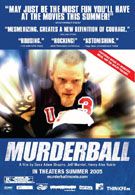A Mexican revolutionary named Emiliano Zapata coined the phrase, “It is better to die on your feet than to live on your knees.” While the metaphorical impact of the quote is resonant, there is something amazing about seeing people inspire hope and change without ever standing up.
Murderball is a documentary following 2.5 years in the lives of intensely competitive rugby players. They slam into each other, spew obscenities, and strive to score points with passionate fervor. What separates them from typical brutish NFL players or people like Mike Tyson who lunge at ears, is that they are confined indefinitely to wheelchairs. The sport is Quad Rugby, known also as Murderball, and their goal is to excel and win big at the Paralympics. The players point out that the event is not the same as the Special Olympics (although there’s nothing wrong with that). “We’re not going for a hug; we’re going for the gold medal” says a teammate matter-of-factly.
The movie revolves around members of Team USA, who have dominated the field of Quad Rugby for the past 10 years. Former USA all-star Joe Soares, one of the best players in the world, was humiliated when he didn’t make the cut for the 2000 team. He responds by jumping ship and coaching Team Canada, much to the dismay of his former American comrades, namely ringleader Mark Zupan. While they are both strong men with a commanding presence, at the core they are fighting their own personal demons. They mutually strive to make something great of themselves in spite of their physical shortcomings.
What makes Murderball so effective is that it debunks just about every clichéd stereotype we are brainwashed with about the handicapped. These are predominantly young men in their 20s and 30s, but other than paralysis they're just like every other guy you knew and probably dated in high school. They are pranksters, laughing and drinking at poker night, and charmers, later putting their moves to the test by approaching the prettiest girls in the bar. Although asked regularly if they are able to have sex, the answer always stuns people---yes, they can. Wild mid-air sex on a trampoline is however, probably out of the question.
The personal relationships of the players are especially memorable. Mark, with a goatee, tattoos and a fairly intimidating quality, was paralyzed from a drunk driving accident caused by his best friend, Chris Igoe. They both want to reinstate their friendship but are too nervous to make the first move. Joe Soares, disabled from polio in childhood, is a family man, with a supportive wife and sensitive son, Robert. He sometimes puts them second to his coaching pursuits, but when illness strikes he is forced to re-evaluate his priorities. Keith Cavill had an affinity for extreme sports that unfortunately led to his accident. “What was once normal will never be the same, and that’s just setting in right now,” he says wistfully when coming home for the first time after his accident. When he meets the Quad Rugby team at the hospital and learns that the sport can give him a second chance at athletic dreams, a future Team USA player is born.
All of the people in Murderball are imperfect, which makes them all the more relatable. These are not the saintly figures painted to us by too many movie-of-the-week specials. They are an extremely funny, intelligent, lively bunch of men, with the same flaws that plague the rest of humanity. While rugby is heavily focused on in the film, above all else it’s about people overcoming great odds to embrace the vitality of life. I didn’t leave the theater thankful that I have my legs; instead I hoped I'd one day possess even a flicker of their relentless optimism.
Directors Henry-Alex Rubin and Dana Adam Shapiro devoted years of their lives to this documentary, and their commitment has resulted in a rare cinematic gem, not be missed. Their quick editing and fast-paced musical background keeps the movie light and pleasant, while earning the film a much-deserved editing prize at the Sundance Film Festival. Murderball will change the way you view the handicapped and make you embarrassed for your previous misconceptions. These quadriplegics do not want pity or sympathy; in fact they resent it. They are vibrant, prosperous people with an infectious amount of passion. We should all be so disabled.
Most Popular




